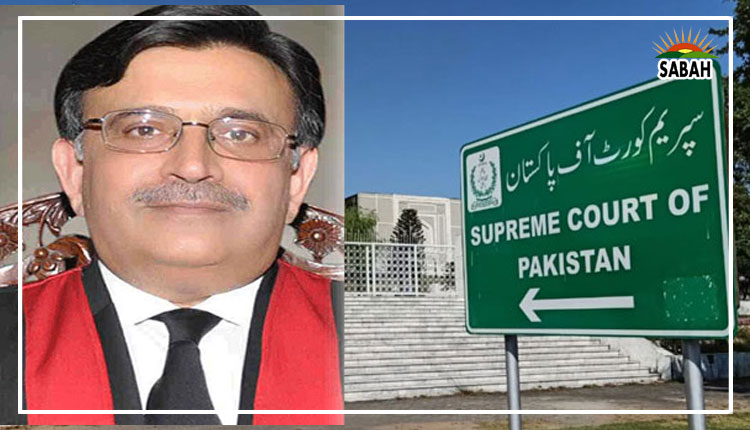Country needed to be taken towards ‘mature democracy’ for which legislative discussion was essential: CJP Umar Ata Bandial
ISLAMABAD, April 22 (SABAH): Supreme Court of Pakistan judge Justice Munib Akhtar, who is part of a five-member bench hearing a presidential reference seeking the SC’s interpretation of Article 63-A of the Constitution, observed on Friday that the “honourable way out for dissident lawmakers is to resign and go home”.
He was responding to PML-N counsel Makhdoom Ali Khan’s argument that disloyalty to the party was different from disloyalty to the state.
During a hearing earlier this week, Justice Akhtar had likened defection in parliamentary democracy to the devastation wrought by cancer on a human body.
The five-member bench of the SC hearing the presidential reference, which is related to disqualification of lawmakers over defection, is headed by Chief Justice of Pakistan Justice Umar Ata Bandial and comprises Justice Ijazul Ahsan, Justice Mazhar Alam Khan Miankhel, Justice Munib Akhtar and Justice Jamal Khan Mandokhail.
When the hearing resumed on Friday, PTI counsel Senator Syed Ali Zafar continued his arguments, saying the purpose of Article 63-A was to end horse-trading. “Violation of 63-A is a violation of the Constitution,” he said, adding that votes cast by dissident lawmakers would not be counted as per the concerned article.
“There are court decisions on the role and importance of political parties. Independents and ticket holders of political parties become members [of the National Assembly] and Article 63-A is related to a member of the latter,” he said.
Justice Ahsan questioned whether Zafar meant the votes would not be counted under Article 63-A, to which the counsel replied that he was saying the same in light of judicial interpretation.
The judge observed that counting of votes and dissent were two separate matters, asking whether a lawmaker’s vote would not be counted even if there were no instructions from the party head.
Zafar replied that the party head would first issue instructions about voting and then the declaration regarding dissident members.
Justice Mandokhail then repeated Justice Ahsan’s question about counting of votes in the absence of instructions from the party head, observing that if votes were not counted, it would mean no wrong had been committed since the concerned Article would come into force only after the vote has been cast.
He observed that according to Article 63-A, a dissident lawmaker could cast his vote but he would subsequently lose his seat.
Meanwhile, Justice Miankhel observed that the party head could only give a declaration after the vote had been cast, adding that the party chief could inform the speaker even while polling was going on.
Justice Mandokhail pointed out that after the vote had been cast, the party chief would first issue a show cause notice and seek the dissident member’s reply.
“The party chief may end the show cause after being satisfied with the response received,” Justice Mandokhail added.
Justice Ahsan questioned whether the decision regarding defection was taken by the head or the parliamentary party and what the procedure was.
A parliamentary party has a constitution and the majority took the decision, Zafar responded.
Justice Mandokhail questioned why political parties could not deal with the “cancer” of defection themselves. “If political parties have a problem, they should treat it.”
Addressing the PTI counsel, he said the stance of most parties was different to the PTI’s. “Are you expecting that we will leave the majority and agree with you? Only one political party is against dissidents.”
Zafar responded that the authority to interpret the Constitution lay with the Supreme Court.
Justice Ahsan observed it was “very clear” that legislation was the parliament’s job and interpreting those laws was the court’s duty. “The purpose of Article 63-A’s inclusion was to end the cancer of defection,” he added. The bench directed Zafar to submit detailed arguments.
PML-Q lawyer Azhar Siddique Advocate endorsed the PTI counsel’s arguments, saying Article 63-A was a “protective wall” against a no-trust resolution. Whatever had happened in the recent no-confidence vote that led to the ouster of Imran Khan was against the charter of democracy, he added.
Meanwhile, PML-N counsel Makhdoom Ali Khan argued that the National Assembly’s term was five years and a dissident lawmaker could be disqualified only for that length.
He recalled that Imran Khan had submitted a petition in the Supreme Court, seeking a lifetime ban from contesting elections for dissident lawmakers.
The chief justice noted that the question raised in the petition was the same as that in the reference.
“The court has no evidence in front of it as to why the lawmakers became dissidents. There is no proof of bribery or changing of consciences,” the PML-N counsel said, arguing that it was not the dissident lawmaker’s job to provide reasons for his defection.
The legal fraternity and the public had protested over certain constitutional amendments, he said. “The 7th Constitutional Amendment allowed [the government] to summon the armed forces in aid of civil institutions. The armed forces’ actions in helping civil institutions were excluded from judicial jurisdiction.”
The chief justice asked whether the apex court’s interpretation of the law was limited to the questions asked in the reference to which Khan replied that the SC had been asked its opinion and it could exercise its authority under Article 184(3), which empowers the top court to intervene in matters involved in enforcement of fundamental rights.
The CJP remarked that the country needed to be taken towards “mature democracy” for which legislative discussion was essential. He added that politicians needed to make “sacrifices”.
The PML-N counsel said the PTI chairman had argued in his petition that the votes of dissident lawmakers should not be counted, adding that the reference had been filed to save the former premier from the no-trust vote.
“The court gave a historic decision to restore the Assembly,” he added, referring to the SC’s decision to set aside the deputy speaker’s ruling to dismiss the no-trust resolution against Imran Khan and the subsequent dissolution of the NA by the president.
“We do whatever seems correct in accordance with [our] consciences and the Constitution,” the chief justice responded. “We pray that improvement comes in the country because of our decisions.”
Justice Mazhar Alam Khan Miankhel remarked that the party chief would issue the declaration only after the vote was cast and added that the party head could also convey it to the speaker at the time of voting.
CJ Bandial asked whether he was referring to Article 96 during the Bhutto era as per which minority votes were not counted. “In order to end this menace and for the sake of national interest, such votes should not be counted.”
Justice Mandokhel said the political parties should resolve this issue on their own. He said only one political party, the PTI, was against defections. Are you asking the court to ignore all other parties and decide the case in favour of a single party, he asked.
Adopting Barrister Ali Zafar’s arguments, the PML-Q lawyer said that Article 63-A was a “protective wall” against the no-confidence motion.
CJ Bandial said the court wanted to reach a decision on Article 63-A as soon as possible. “We make decisions as per the Constitution and our conscience so that Pakistan could prosper,” he added.
CJ Bandial asked whether the court was bound to interpret the Constitution with respect to the question it was asked. The PML-N lawyer said the court could use Article 184/3 as well. He added that Article 63-A was not inserted to stop disloyalty from parties. Subsequently, the hearing was adjourned till after Eidul Fitr.












